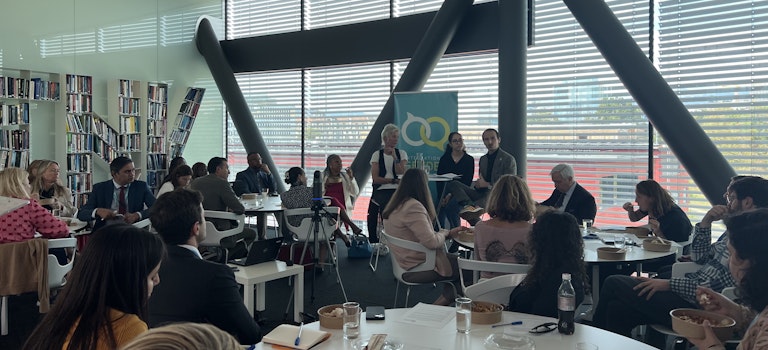Around the world, progressive forces are facing strong opposition towards women’s rights and the fundamental notions of gender and gender equality. To address this issue, the IGC Secretariat held its 3rd Lunch & Learn event on “When the patriarchy fights back: Tackling the transnational gender backlash” with the aim of promoting an understanding of the origins and narrative of the anti-gender movement whilst also discussing ways to effectively address the pushback.
The event took place on the 31st of August 2023 at the Geneva Centre for Security Policy (GCSP) and featured two inspiring Gender Champions: Madeleine Rees, Secretary General of the Women’s International League for Peace and Freedom (WILPF), and Darius Farman, Co-director of foraus, the Swiss grassroots think tank for foreign policy. The discussion was moderated by Asmaa El Alaoui Talibi, a master’s student at the Geneva Graduate Institute and intern at the Geneva Centre for Security Sector Governance (DCAF).

Rees, adopting a political economy perspective, underscored that the normative and legal frameworks for safeguarding gender equality are thwarted by existing social and economic structures. She explained that we have “failed to create the nutrients for [the frameworks and laws] to blossom and grow”. As a result, according to Rees, it is necessary to look at the anti-gender backlash as a structural issue in which reactionary forces respond to the perceived threats to existing power structures. To address this, she suggests looking at gender relations beyond the binary and bringing in male allies to fight back.
Meanwhile, Farman highlighted that gender and gender equality have become highly politicised issues, which are strategically used by different actors to advance their (often conservative) political agendas. These dynamics can be seen across the world at the national, international and transnational levels. Farman underscored the importance of gaining clarity on the variety of actors and arguments involved to understand how to best counteract the backlash. He subsequently put forward the open question of how to build alliances and create consensus around such a contentious issue, while continuing to expose – and tackle – different forms of discrimination. He stressed that, in this context,“language has the power of bringing people together and drifting them apart”.
Participants raised concerns regarding the continuing pushback received within the United Nations Human Rights Council on issues related to sexual orientation and gender identity. Furthermore, they emphasized the important role that technology, particularly social media, plays in feeding into and enabling the anti-gender movement.

This event was part of the IGC 'Lunch and Learn' series, which aims to foster interactions between the IGC community, experts, academics, and activists. It is made possible by a grant from the US Mission and serves as a platform for dialogue and knowledge exchange. The event is open to IGC Focal points, Champions and the broader public, including students.
